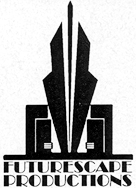Difference between revisions of "Futurescape Productions"
From Sega Retro
m (→Company) |
m |
||
| Line 7: | Line 7: | ||
==Company== | ==Company== | ||
| − | Co-founded by former [[Electronic Arts]] technical director [[Kevin McGrath]] and programmer [[Kenneth Hurley]] in October 1992{{ref|http://web.archive.org/web/20210509222319/https://opencorporates.com/companies/us_ca/C1825862}}, FutureScape Productions served as a third-party game developer for publishers such as [[Sega]], [[Electronic Arts]], [[Crystal Dynamics]]{{ref|https://web.archive.org/web/20210509222952/http://www.drawrick.com/videogamegraphics2D3D.html}}, and [[Accolade]]. The company consisted of about 9 people, including four artists, three programmers, one business manager, and a CEO.{{ref|https://www.linkedin.com/in/ | + | Co-founded by former [[Electronic Arts]] technical director [[Kevin McGrath]]{{ref|https://www.linkedin.com/in/kmcgrath/details/experience/}} and programmer [[Kenneth Hurley]] in October 1992{{ref|http://web.archive.org/web/20210509222319/https://opencorporates.com/companies/us_ca/C1825862}}, FutureScape Productions served as a third-party game developer for publishers such as [[Sega]], [[Electronic Arts]], [[Crystal Dynamics]]{{ref|https://web.archive.org/web/20210509222952/http://www.drawrick.com/videogamegraphics2D3D.html}}, and [[Accolade]]. The company consisted of about 9 people, including four artists, three programmers, one business manager, and a CEO{{ref|https://www.linkedin.com/in/klhurley/details/experience/}}, with up to four additional contracted employees.{{ref|https://www.linkedin.com/in/kmcgrath/details/experience/}} According to Hurley, his (and likely most of FutureScape's games) were coded in [[wikipedia:C (programming language)|C]], [[wikipedia:C++|C++]], and [[wikipedia:Assembly language|assembly language]]. Importantly, the company was located just a few minutes' drive from [[Sega of America]]'s headquarters, allowing quick and local access to the company's resources. |
Sometime in 1994{{ref|https://www.linkedin.com/in/kmcgrath/}} (either that February{{ref|https://www.linkedin.com/in/rick-lucey-336a9720/details/experience/}} or August{{ref|https://www.linkedin.com/in/klhurley/details/experience/}}), {{PAGENAME}} appears to have gone out of business. | Sometime in 1994{{ref|https://www.linkedin.com/in/kmcgrath/}} (either that February{{ref|https://www.linkedin.com/in/rick-lucey-336a9720/details/experience/}} or August{{ref|https://www.linkedin.com/in/klhurley/details/experience/}}), {{PAGENAME}} appears to have gone out of business. | ||
Revision as of 07:29, 14 April 2024

| ||
| Futurescape Productions | ||
|---|---|---|
| Founded: 1992-10-01[1] | ||
| Defunct: 1994[2] | ||
Headquarters:
|
This short article is in need of work. You can help Sega Retro by adding to it.
Futurescape Productions was an American video game developer most known for providing software for dedicated peripherals, such as the unreleased Sega VR game Nuclear Rush.
Company
Co-founded by former Electronic Arts technical director Kevin McGrath[4] and programmer Kenneth Hurley in October 1992[1], FutureScape Productions served as a third-party game developer for publishers such as Sega, Electronic Arts, Crystal Dynamics[3], and Accolade. The company consisted of about 9 people, including four artists, three programmers, one business manager, and a CEO[5], with up to four additional contracted employees.[4] According to Hurley, his (and likely most of FutureScape's games) were coded in C, C++, and assembly language. Importantly, the company was located just a few minutes' drive from Sega of America's headquarters, allowing quick and local access to the company's resources.
Sometime in 1994[2] (either that February[6] or August[5]), Futurescape Productions appears to have gone out of business.
Softography
Mega Drive
- Ballz 3D (1994) (some programming)
- Chameleon (unreleased)
- Monster Hunter (unreleased)
- Relentless (unreleased)
- Sid & Al's Incredible Toons (unreleased)
- Nuclear Rush (unreleased)
Mega-CD
- Carnage (unreleased)
- Sid & Al's Incredible Toons (unreleased)
References
- ↑ 1.0 1.1 1.2 https://opencorporates.com/companies/us_ca/C1825862 (Wayback Machine: 2021-05-09 22:23)
- ↑ 2.0 2.1 https://www.linkedin.com/in/kmcgrath/
- ↑ 3.0 3.1 http://www.drawrick.com/videogamegraphics2D3D.html (Wayback Machine: 2021-05-09 22:29)
- ↑ 4.0 4.1 https://www.linkedin.com/in/kmcgrath/details/experience/
- ↑ 5.0 5.1 https://www.linkedin.com/in/klhurley/details/experience/
- ↑ https://www.linkedin.com/in/rick-lucey-336a9720/details/experience/